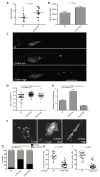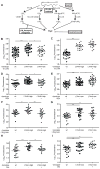Host genotype-specific therapies can optimize the inflammatory response to mycobacterial infections
- PMID: 22304914
- PMCID: PMC3433720
- DOI: 10.1016/j.cell.2011.12.023
Host genotype-specific therapies can optimize the inflammatory response to mycobacterial infections
Abstract
Susceptibility to tuberculosis is historically ascribed to an inadequate immune response that fails to control infecting mycobacteria. In zebrafish, we find that susceptibility to Mycobacterium marinum can result from either inadequate or excessive acute inflammation. Modulation of the leukotriene A(4) hydrolase (LTA4H) locus, which controls the balance of pro- and anti-inflammatory eicosanoids, reveals two distinct molecular routes to mycobacterial susceptibility converging on dysregulated TNF levels: inadequate inflammation caused by excess lipoxins and hyperinflammation driven by excess leukotriene B(4). We identify therapies that specifically target each of these extremes. In humans, we identify a single nucleotide polymorphism in the LTA4H promoter that regulates its transcriptional activity. In tuberculous meningitis, the polymorphism is associated with inflammatory cell recruitment, patient survival and response to adjunctive anti-inflammatory therapy. Together, our findings suggest that host-directed therapies tailored to patient LTA4H genotypes may counter detrimental effects of either extreme of inflammation.
Copyright © 2012 Elsevier Inc. All rights reserved.
Figures







Comment in
-
Innate immunity to TB: a druggable balancing act.Cell. 2012 Feb 3;148(3):389-91. doi: 10.1016/j.cell.2012.01.026. Cell. 2012. PMID: 22304907
References
-
- Agarwal N, Lamichhane G, Gupta R, Nolan S, Bishai WR. Cyclic AMP intoxication of macrophages by a Mycobacterium tuberculosis adenylate cyclase. Nature. 2009;460:98–102. - PubMed
-
- Ariel A, Chiang N, Arita M, Petasis NA, Serhan CN. Aspirin-triggered lipoxin A4 and B4 analogs block extracellular signal-regulated kinase-dependent TNF-alpha secretion from human T cells. J Immunol. 2003;170:6266–6272. - PubMed
-
- Auerbach BJ, Bisgaier CL, Wolle J, Saxena U. Oxidation of low density lipoproteins greatly enhances their association with lipoprotein lipase anchored to endothelial cell matrix. J Biol Chem. 1996;271:1329–1335. - PubMed
-
- Behr M, Schurr E, Gros P. TB: screening for responses to a vile visitor. Cell. 2010;140:615–618. - PubMed
Publication types
MeSH terms
Substances
Grants and funding
LinkOut - more resources
Full Text Sources
Other Literature Sources
Medical
Molecular Biology Databases
Miscellaneous

